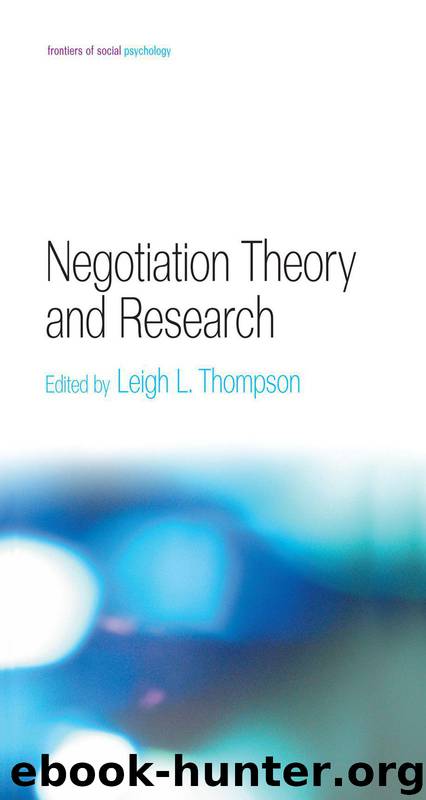Negotiation Theory and Research (Frontiers of Social Psychology) by Unknown

Author:Unknown
Language: eng
Format: mobi
ISBN: 9781135423513
Publisher: Taylor and Francis
Published: 2006-01-12T14:00:00+00:00
References
Adams, J. S. (1963). Toward an understanding of inequity. Journal of Abnormal and Social Psychology, 67, 422–436.
Allred, K. G. (1999). Anger and retaliation: Toward an understanding of impassioned conflict in organizations. In R. J. Bies, R. J. Lewicki, & B. H. Sheppard (Eds.), Research on negotiation in organizations (Vol. 7, pp. 27–58). Stamford, CT: JAI Press.
Allred, K. G., Mallozzi, J. S., Matsui, F., & Raia, C. P. (1997). The influence of anger and compassion on negotiation performance. Organizational Behavior and Human Decision Processes, 70, 175–187.
Anderson, C., & Thompson, L. L. (2004). Affect from the top down: How powerful individuals’ positive affect shapes negotiations. Organizational Behavior and Human Decision Processes, 40, 125–139.
Arnold, M. B. (1960). Emotion and personality (Vol. 1, Psychological aspects). New York: Columbia University Press.
Averill, J. R. (1980). A constructivist view of emotion. In R. Plutchik & H. Kellerman (Eds.), Emotion: Theory research, and experience (Vol. 1., pp. 305–339). New York: Academic Press.
Axelrod, R. (1984). The evolution of cooperation. New York: Basic Books.
Baron, R. A. (1990). Environmentally induced positive affect: Its impact on self-efficacy, task performance, negotiation, and conflict. Journal of Applied Social Psychology, 20, 368–384.
Barry, B. (1999). The tactical use of emotion in negotiation. In R. J. Bies, R. J. Lewicki, & B. H. Sheppard (Eds.), Research on negotiation in organizations (Vol. 7, pp. 93–121). Stamford, CT: JAI Press.
Barry, B., & Fulmer, I. S. (in press). Methodological challenges in the study of negotiator affect. International Negotiation.
Barry, B., Fulmer, I. S., & Kleef, G. van (2004). I laughed, I cried, I settled: The role of emotion in negotiation. In M. J. Gelfand & J. M. Brett (Eds.), The Handbook of negotiation and culture: Theoretical advances and cross-cultural perspectives (pp. 71–94). Palo Alto, CA: Stanford University Press.
Barry, B., & Oliver, R. L. (1996). Affect in dyadic negotiation: A model and propositions. Organizational Behavior and Human Decision Processes, 67, 127–143.
Bechara, A., Damasio, H., Tranel, D., & Damasio, A. R. (1997). Deciding advantageously before knowing the advantageous strategy. Science, 275, 1293–1295.
Berntson, G. G., & Cacioppo, J. T. (2000). Psychobiology and social psychology: Past, present, and future. Personality and Social Psychology Review, 4, 3–15.
Bless, H. (2000). Mood and the use of general knowledge structures. In L. L. Martin & G. L. Clore (Eds.), Theories of mood and cognition: A user’s handbook (pp. 9–26). Mahwah, NJ: Lawrence Erlbaum Associates.
Bless, H. (2001). The consequences of mood on the processing of social information. In A. Tesser & N. Schwartz (Eds.), Blackwell handbook of social psychology: Intraindividual processes (pp. 391–412). Malden, MA: Blackwell Publishers, Inc.
Borod, J. C. (Ed.). (2000). The neuropsychology of emotion. New York: Oxford University Press.
Bradley, M. M., & Lang, P. J. (2000). Measuring emotion: Behavior, feeling, and physiology. In R. D. Lane & L. Nadel (Eds.), Cognitive neuroscience of emotion (pp. 242–276). Oxford, UK: Oxford University Press.
Brett, J. F., Northcraft, G, B., & Pinkley, R. L. (1999). Stairways to heaven: An interlocking self-regulation model of negotiation. Academy of Management Review, 24, 435–451.
Brief, A. P., & Weiss, H. M. (2002). Organizational behavior: Affect in the workplace.
Download
This site does not store any files on its server. We only index and link to content provided by other sites. Please contact the content providers to delete copyright contents if any and email us, we'll remove relevant links or contents immediately.
The Brazilian Economy since the Great Financial Crisis of 20072008 by Philip Arestis Carolina Troncoso Baltar & Daniela Magalhães Prates(105948)
International Integration of the Brazilian Economy by Elias C. Grivoyannis(75743)
The Art of Coaching by Elena Aguilar(52214)
Flexible Working by Dale Gemma;(23213)
How to Stop Living Paycheck to Paycheck by Avery Breyer(19572)
The Acquirer's Multiple: How the Billionaire Contrarians of Deep Value Beat the Market by Tobias Carlisle(12115)
Thinking, Fast and Slow by Kahneman Daniel(11808)
The Radium Girls by Kate Moore(11639)
The Art of Thinking Clearly by Rolf Dobelli(9930)
Hit Refresh by Satya Nadella(8870)
The Compound Effect by Darren Hardy(8527)
Atomic Habits: Tiny Changes, Remarkable Results by James Clear(8055)
Tools of Titans by Timothy Ferriss(7828)
Turbulence by E. J. Noyes(7717)
Change Your Questions, Change Your Life by Marilee Adams(7388)
A Court of Wings and Ruin by Sarah J. Maas(7286)
Nudge - Improving Decisions about Health, Wealth, and Happiness by Thaler Sunstein(7261)
How to Be a Bawse: A Guide to Conquering Life by Lilly Singh(7165)
Win Bigly by Scott Adams(6836)
